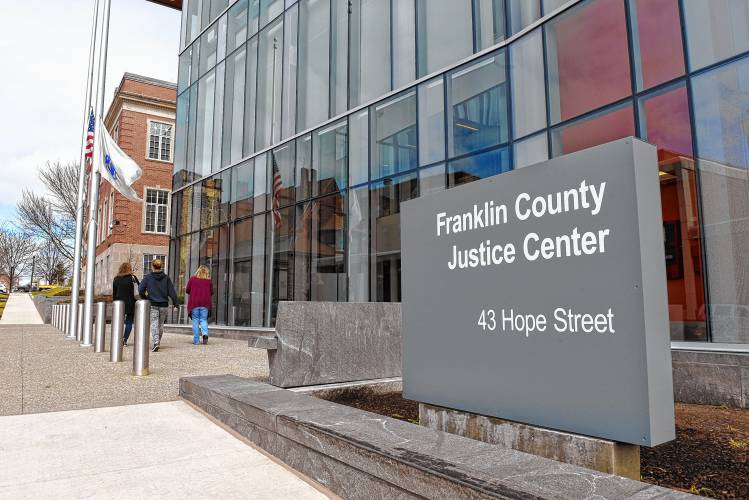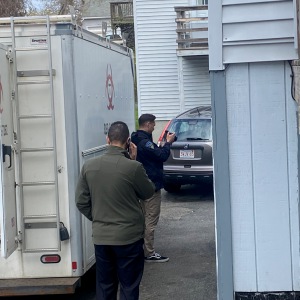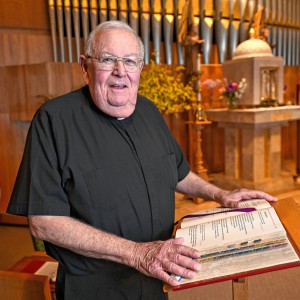Early success in Greenfield prompts statewide launch of Family Treatment Court

The Franklin County Justice Center on Hope Street in Greenfield. STAFF FILE PHOTO
|
Published: 04-07-2024 4:01 PM
Modified: 04-09-2024 4:03 PM |
Early success in the Franklin County Probate and Family Court has spawned a statewide launch of Family Treatment Court sessions to address the needs of families involved in Juvenile Court cases in which substance use is a contributing factor.
PATHS (Prevention and Treatment for the Health and Safety of Children and Families) Family Treatment Courts are non-adversarial, collaborative court sessions working with child protective services, substance use and mental health treatment professionals, and community partners to coordinate services to ensure children have safe, nurturing and permanent homes and that parents/guardians achieve stable recovery from drug abuse. Judge Beth Crawford, then a Franklin Probate and Family Court judge, founded the Greenfield session in her courtroom in 2016 before a $2.1 million federal grant enabled an expansion to Juvenile Court the following year.
“I think we were very lucky to start out in Greenfield,” she said. “I think Greenfield was really the perfect place.”
The statewide launch started in December, with a PATHS Family Treatment Court opening in Hampden County Juvenile Court in Springfield. The expansion was made possible by a $1.5 million grant from the federal Office of Juvenile Justice and Delinquency Prevention to develop and implement family treatment courts across the state. Crawford said the next locations will be Fall River and Lawrence. The Trial Court also provides additional funding.
Kathleen Sandman is now the Treatment Court’s presiding judge, having replaced Crawford when the latter retired in 2021. She said she has seen the court’s benefits with her own eyes.
“There are many,” she said. “The obvious [one] is people are able to reunify with their children.”
Crawford explained this program started as an idea in the early 1990s when attorneys Diane Esser and Tom Merrigan were asked to joined the Supreme Judicial Court’s task force to examine alternative ways to handle these wrenching issues.
According to information from the state Supreme Judicial Court’s public information office, research cited by the California-based Center for Children and Family Futures shows that family treatment courts assist parents in entering treatment more quickly, staying in treatment longer, and completing treatment at higher rates when compared with conventional child welfare and dependency court interventions. They also increase the likelihood of reunification of children and parents with no effect on the risk of repeat maltreatment or reentry into the child welfare system and reduce the amount of time children spend in out-of-home care. There are reportedly at least 60 specialty court sessions in Massachusetts focused on issues like substance use disorders, mental health conditions, veterans issues, and family recovery and dispute resolution.
Article continues after...
Yesterday's Most Read Articles
 Authorities ID victim in Greenfield slaying
Authorities ID victim in Greenfield slaying
 State records show Northfield EMS chief’s paramedic license suspended over failure to transport infant
State records show Northfield EMS chief’s paramedic license suspended over failure to transport infant
 Police report details grisly crime scene in Greenfield
Police report details grisly crime scene in Greenfield
 On The Ridge with Joe Judd: What time should you turkey hunt?
On The Ridge with Joe Judd: What time should you turkey hunt?
 ‘I have found great happiness’: The Rev. Timothy Campoli marks 50 years as Catholic priest
‘I have found great happiness’: The Rev. Timothy Campoli marks 50 years as Catholic priest
 Formed 25,000 years ago, Millers River a historic ‘jewel’
Formed 25,000 years ago, Millers River a historic ‘jewel’
“I have nothing but the best of hope,” Sandman said. “The need, unfortunately, is up.”
The Massachusetts Trial Court marked the statewide launch of Family Treatment Court sessions on March 13 with an event at the John Adams Courthouse in Boston. Speakers included Trial Court Chief Justice Heidi Brieger, Trial Court Administrator Thomas Ambrosino, Juvenile Court Chief Justice Amy Nechtem, and Alexis Balkey, program manager for the Center for Children and Family Futures, the national training and technical assistance provider for family treatment courts. A short video created by staff and graduates of Franklin County’s Family Treatment Court was presented.
“Families across the commonwealth will benefit from the opening of Family Treatment Courts in the Juvenile Court,” Brieger said. “These programs use a collaborative approach to address the needs of parents with substance use disorders, as well as to protect their children throughout the Care and Protection process.”
Reach Domenic Poli at: dpoli@recorder.com or 413-930-4120.
An earlier version of this article unclearly stated which court’s success later inspired the statewide launch of Family Treatment Court sessions to address the needs of families involved in Juvenile Court cases in which substance use is a contributing factor. Judge Beth Crawford founded the Greenfield program in Franklin Probate and Family Court in 2016 before a $2.1 million federal grant enabled an expansion to Juvenile Court the following year.

 What are the protocols for emergency transport of infants?
What are the protocols for emergency transport of infants?
